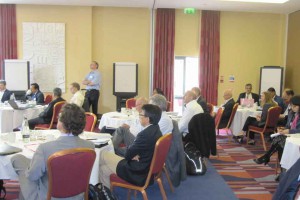20th June 2014 Mumbai, India
UK-India civil nuclear collaboration – phase III
Last week, I spent two days (11-12 June) with nuclear scientists from the UK and India at Oxford. The meeting, facilitated by RCUK India and co-organised by the EPSRC and Department of Atomic Energy (DAE), was held to outline proposals for joint research projects under the Phase III programme of UK-India collaboration in civil nuclear research.
A six-member Indian delegation representing the Bhabha Atomic Research Centre (BARC) and Indira Gandhi Centre for Atomic Research attended the meeting, which involved participation from experts based out of universities spread across the UK.  Specifically, the discussions at this intensive 2-day workshop were geared towards identifying potential UK-India joint projects in areas such as new reactor design (from a safety perspective), public understanding of nuclear safety, and other areas building upon from projects of Phase I and II.
Specifically, the discussions at this intensive 2-day workshop were geared towards identifying potential UK-India joint projects in areas such as new reactor design (from a safety perspective), public understanding of nuclear safety, and other areas building upon from projects of Phase I and II.
The initiation of UK-India partnerships in civil nuclear research happened in 2010 and since then, 12 research projects have taken off the ground with funding support coming from the RCUK Energy Programme and DAE. While the projects in Phase I (2010) focussed on exploring the replacement of uranium with thorium, managing the generation of heat in nuclear reactors, and predicting plant performance, those in Phase II had a steer towards life assessment and structural integrity, modelling and simulation, and severe accident and nuclear safety. A complete listing of the completed and ongoing UK-India projects in civil nuclear research is available here. A total of £4.7m from the RCUK with matched resources from the DAE has enabled the realisation of these joint projects. The outputs from the six projects initiated in Phase I (2010) include 18 joint publications, 15 conference/workshop contributions, and an online proliferation resistance assessment tool jointly developed by the University of Cambridge and BARC.
While India has seen a steady advancement of nuclear energy technologies over the last few decades, the UK has only recently renewed its interest in nuclear power with the government, in 2013, proceeding to construct a new nuclear power station with two generating units at Hinkley Point C, Somerset – a first in two decades. This new plant is expected to produce about 7% of the UK’s total energy, when the construction is completed in 2023. The current social and political perspectives on nuclear energy in both countries, coupled with the meaningful outputs of the joint projects over the last five years, augur well for future UK-India partnerships in civil nuclear research.
 After several invigorating and targeted group discussions, as the 2-day meet drew to a close, the experts agreed upon a shortlist of UK-India research projects for Phase III. Broadly, these included smart monitoring and control systems, waste management, and public engagement, among others. The EPSRC and DAE will review these proposals and take the discussion forward. Watch for this space for updates on the projects finalised for UK-India Civil Nuclear Collaboration – Phase III!
After several invigorating and targeted group discussions, as the 2-day meet drew to a close, the experts agreed upon a shortlist of UK-India research projects for Phase III. Broadly, these included smart monitoring and control systems, waste management, and public engagement, among others. The EPSRC and DAE will review these proposals and take the discussion forward. Watch for this space for updates on the projects finalised for UK-India Civil Nuclear Collaboration – Phase III!